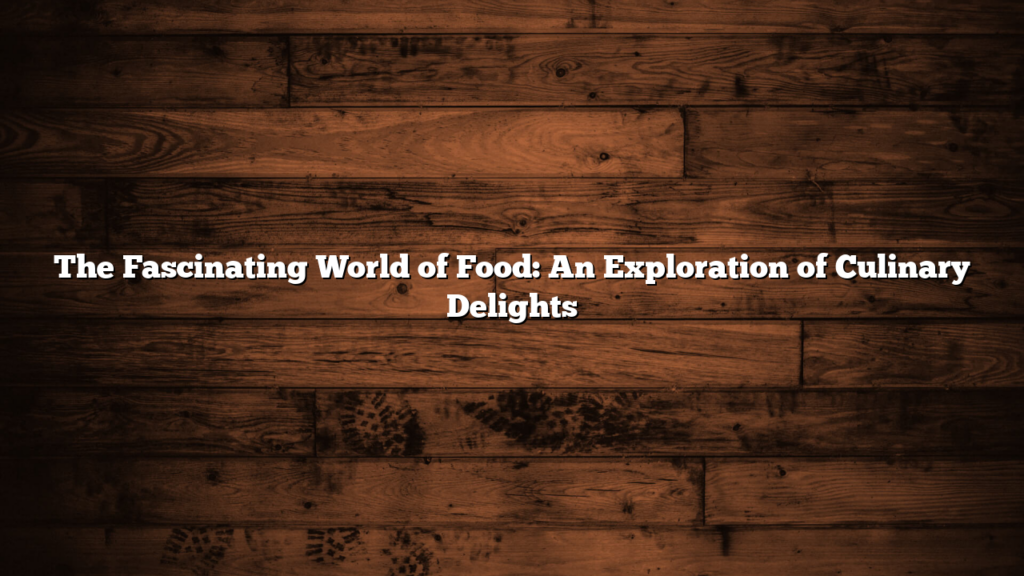
The Fascinating World of Food: An Exploration of Culinary Delights
Food is more than just fuel for the body; it’s a cultural expression, an art form, and a source
of connection between people. From the comfort of a home-cooked meal to the elaborate
dishes served in fine-dining restaurants, food plays a central role in daily life, evoking
emotions and memories while offering a sensory experience that nourishes both the body
and the soul.
The Role of Food in Culture and Society
Food has always been deeply intertwined with cultural practices and traditions. Each culture
around the world has developed unique dishes and eating habits that reflect its history,
climate, and values. For instance, Italian cuisine is known for its emphasis on fresh, simple
ingredients like tomatoes, olive oil, and basil, reflecting the agricultural bounty of the
Mediterranean region. On the other hand, Japanese cuisine is famous for its delicate
preparation techniques and respect for seasonal ingredients, emphasizing balance and
harmony in every meal.
Festivals and celebrations often center around food, and these traditions serve as a way of
maintaining a connection to the past. In many cultures, certain foods are prepared for special
occasions like weddings, holidays, and birthdays, carrying with them symbolic meaning and
creating shared experiences. For example, in the United States, Thanksgiving is incomplete
without turkey, stuffing, and cranberry sauce, each item representing a part of the nation’s
culinary history.
The Science of Cooking: A Blend of Art and Chemistry
Cooking is a unique combination of science and art. slot4d behind food is an intricate
web of chemical reactions, physical transformations, and biological processes. For example,
when bread dough is mixed, yeast ferments the sugars, producing carbon dioxide gas, which
causes the dough to rise. This is a simple but fascinating example of how cooking involves a
deep understanding of chemical processes to achieve the desired result.
Heat also plays a crucial role in cooking, as it alters the texture and flavor of ingredients.
Searing meat on high heat caramelizes the sugars on the surface, creating a rich, brown
crust that adds flavor. Roasting vegetables causes their natural sugars to concentrate,
turning them sweet and tender. The way heat is applied—whether through boiling, steaming,
frying, or grilling—can make or break a dish, highlighting the importance of technique in the
kitchen.
At the same time, cooking is also a form of art. The way food is presented, plated, and
garnished can elevate a meal from something ordinary into an extraordinary visual
experience. Chefs around the world are constantly pushing the boundaries of what is
possible with food, experimenting with textures, colors, and flavors to create dishes that are
not only delicious but visually stunning.
Nutrition and the Importance of a Balanced Diet
Beyond its sensory appeal, food is essential for our survival. The nutrients we get from the
foods we eat fuel our bodies, repair tissues, and support the immune system. A balanced
diet is crucial for maintaining good health, as it provides the necessary vitamins, minerals,
proteins, fats, and carbohydrates that our bodies need to function properly.
Carbohydrates, found in foods like bread, rice, and pasta, are the body’s primary source of
energy. Proteins, found in meat, beans, and nuts, are vital for building and repairing tissues.
Healthy fats, found in avocados, olive oil, and fish, support brain function and help absorb
essential vitamins. A lack of any of these nutrients can lead to deficiencies and health
problems.
In recent years, there has been a growing awareness of the importance of eating a diverse,
nutrient-rich diet. This has led to the rise of diets focused on plant-based foods, organic
produce, and whole foods, as well as an increased interest in sustainable and ethical food
production. People are more conscious about where their food comes from and how it is
produced, with a focus on reducing food waste and supporting local farmers.
Food Trends and Innovations
Food trends come and go, often reflecting broader societal shifts and technological
innovations. Over the past decade, there has been a surge in interest in plant-based diets,
with more people choosing to reduce their meat consumption or adopt a fully vegetarian or
vegan lifestyle. The popularity of plant-based alternatives like Beyond Meat and Impossible
Foods has led to a transformation in the food industry, with major fast food chains and
supermarkets offering meat-free options.
In addition to plant-based eating, sustainability has become a central theme in food trends.
Consumers are increasingly concerned about the environmental impact of food production
and are seeking out eco-friendly options. This has led to a rise in interest in local and
seasonal foods, as well as sustainable farming practices that minimize the use of pesticides,
chemicals, and water.
Technology has also played a role in shaping the future of food. Advances in food science
have led to the development of lab-grown meats, which could potentially reduce the need for
traditional animal farming, mitigating the environmental impact of meat production. Similarly,
food delivery services and meal kits have revolutionized how people access and prepare
food, providing convenience and variety while introducing new culinary experiences.
The Joy of Sharing Meals
One of the most powerful aspects of food is its ability to bring people together. Sharing a
meal is an ancient tradition that transcends borders and cultures. Whether it’s a family
gathering around the dinner table or friends enjoying a meal at a restaurant, food fosters
connection and community.
In many ways, the act of preparing and sharing food is a form of love and care. The effort put
into selecting ingredients, cooking, and presenting a meal speaks volumes about the
importance of nurturing relationships and creating lasting memories. The exchange of
recipes, the sharing of cooking tips, and the exploration of new flavors all contribute to the
communal joy of eating.
Conclusion
Food is far more than just something we consume to survive; it is a source of enjoyment, a
reflection of culture, and a means of connecting with others. From the science of cooking to
the art of presentation, food is an ever-evolving field that continues to inspire creativity and
innovation. Whether we’re exploring new trends, enjoying familiar comfort foods, or learning
about the nutritional value of different ingredients, food is an integral part of our lives,
enriching our daily experiences and strengthening the bonds between us.


